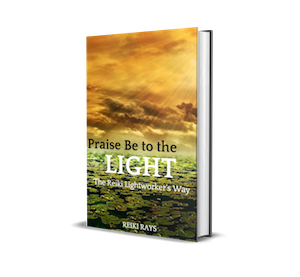The Reiki principles are a fundamental part of our Reiki training, yet many see them as no more than a set of ideals that don’t directly affect our practice. It’s true we would get the same results even if we weren’t aware of these principles but to merely use them as a mantra overlooks their power to heal on a personal level. These principles stand alone and any one applying them in their lives whether Reiki trained or not will effect healing in themselves for the principles contain the power to heal the mind, body, and spirit. Although the wording may vary the essence never changes. It asks us to give up and release an attitude or action that has the potential to create illness, disease, and eventually death if sustained for a considerable period of time. If we take each one and look at the benefits of their implementation in our lives we will begin to understand why Dr. Usui says “Just for today”.
1. I will not anger.
We are raised to believe the expression of anger is wrong, dangerous, and unacceptable so from an early age we learn to suppress our anger and disguise our true feelings in order to survive as individuals, gain favor, and avoid punishment. Many see it as simply a negative emotion yet we are designed to react in a positive way to danger and this instinctive ‘fight or flight’ response has enabled us to survive as a species. Not only is this positive energy necessary for our survival it also provides us with the means to protect the weak and right all manner of wrongs that may offend our sense of truth and justice. However, if we don’t use this energy in an appropriate way, dealing openly with situations and problems it can become contaminated with guilt, frustration, and resentment and become destructive anger. This anger is dangerous, and if sustained for an extended period of time can lead to illness and disease.
If this repressed anger continues into adulthood as it nearly always does, it can lead to chronic illness and disease. Our thoughts trigger emotions which then show up as physical symptoms in every part of our body. There is always a connection, we can lie to others and we can even lie to ourselves, but our bodies never lie. Is it any wonder that Dr. Usui asks us just for today don’t get angry.
2. I will not worry.
To be able to foresee danger is necessary for our survival and anticipation is a positive and valuable ability but worrying is both negative and debilitating and uses up a great deal of time and energy. Worry and its best friend fear create a loop that becomes a self-fulfilling prophecy, we worry about the future and our worry and fear through the power of our intent help create the thing we fear the most. We focus on the problem but we fail to shift our perspective on to the possible solutions and in the process use up all of our energy needed to face and deal with the problem. The costs of worrying far outweigh the possible benefits and we should never confuse worry with concern, worrying keeps us focused on the problem while healthy concern helps us think about possible solutions. Dwelling only on the problem becomes a rehearsal for failure. There are many ways to reduce the effects of worrying and what all of them have in common is that they recognize the cost of worrying on a physical, mental, and emotional level. They all require a shift in consciousness that takes our focus away from our problems and out of our selves. This requires a balanced outlook that keeps both the problem and solution in perspective and redirecting the energy we have available towards a solution-based outcome to events.
3. Be grateful for your many blessings.
For some of us something awful has to happen before we can begin to appreciate and feel grateful for what we have. We become wrapped up in our own little world of fears and anxieties and in doing so we become isolated and disconnected from the rest of the world. Taking things for granted can affect us in many subtle ways, when we expect to receive more than life or those around us can provide we begin to feel angry and resentful at this perceived short fall in what we feel we deserve. The most dangerous part of this mind set is that without an element of gratitude when we receive what we expect we are rarely if ever satisfied with the results. To enjoy and appreciate more we must first be grateful for what we have no matter how little that may be, if we can’t more will never be enough.
Gratitude reflects quality not quantity and it’s our own values that are reflected back to us that creates this sense of lack or abundance in our lives. Lack or abundance is relative and how we view these extremes can affect the quality of our lives; two people looking at the same set of circumstances can see something totally different. Our glass is either half empty or half full, one says poor me I have so little, the other says aren’t I lucky to have all of this, and whatever you think you are right.
Whatever you believe you are right; and that attitude will be reflected in every aspect of your life. If we want more in our lives then we must give up the restrictions that create deprivation and recognise that abundance is an option we can choose. If you want more of anything the first step is to simply and meaningfully give thanks for everything you have already received in your life for gratitude is a key that opens that particular door. The law of abundance requires that we look at what we have, value all of the lessons it provides us with and then give thanks, in this way more can be released to us in the knowledge that we will use and appreciate everything that is given.

Image by Steven Betts
4. Work honestly.
This principle requires you to be as honest with yourself as you are with other people, honesty requires openness and the ability for you to know and respect yourself, the things we find most attractive in others are the values and strengths we see in ourselves. Honesty also requires self-confidence and self esteem, with these we are able to make judgments and take action based on our own belief system and not through peer pressure, intimidation, or guilt.
The best definition I know of character is ‘doing what’s right when no-one is watching’. Set yourself goals and assess your progress but accept that mistakes are part of your personal development and that they don’t indicate a bad person. Pay attention to what lifts you to greater achievement and what brings you down. Accept yourself, faults and all; while you are busy disowning parts of you that don’t measure up to some unrealistic standard that only exists in your head remember you are a good person, who sometimes makes mistakes. Denial of any kind requires a great deal of sustained energy and the first step of any change is to accept the situation for what it is.
Take personal responsibility for your life, everything in it, and the attainment of your own goals and ambitions, there is nothing more debilitating than waiting for others including spirit/universe to act on your behalf and there is nothing more empowering than realising that no one is going to do it for you.
Assertiveness is having respect for your own needs when dealing with others. Be prepared to stand up for what you believe to be right and never sacrifice your principles for the sake of someone liking you, they may like you for a while but you will dislike yourself for a much longer period of time. Practice personal integrity, be truthful with yourself and with others, never make promises lightly and when you make them ensure you keep them. Honour your commitments and through your actions put your word beyond price, don’t boast or brag and let your actions speak for you in a simple unassuming way. Do what is required and then let go and try not to be attached to the results of your actions.
Honesty requires us to accept full responsibility for our own actions; if we allow others to dictate how we feel and act we are giving away our power to them, our actions are then determined by their values and beliefs no matter how negative or corrupt they may be. If we respond to them in kind instead of how our own values dictate we have given up the right to be offended by them for we have become worse than they are because we know better but are no longer true to ourselves.
5. Be kind to all living things.
In some ways this is the hardest principle to live by. Yes it’s easy to be kind to people you like and who like you, and it’s easy to be kind when it doesn’t cost us anything. The test comes when we are asked to be kind to those people we don’t like and who make us feel angry, frightened, threatened and insecure. We are not asked to like, love, or condone the actions of others, all we are asked to do is to be kind to all living things when the opportunity presents itself. The greatest barrier to kindness is our ability to judge everyone from the standpoint of our own values and beliefs. It’s this I that creates judgment and separation, and fear always walks hand in hand with judgment. We fear anything that challenges our belief system and we take great comfort from the thought that we are in some way different or better than those people we dislike. We can’t bring ourselves to believe that given the right conditions and personal circumstances we could be the kind of person we find it so easy to dislike and hate.
If asked to identify the things in others that make it easy for us to respond with kindness we invariably list the qualities we see in ourselves, the hard part comes when we are asked to be kind to those who may not be grateful or even deserving of our kindness. We are asked to give without judgement or attachment to the outcome of our actions, and when we give freely in this way we open ourselves to the kindness of others. We are asked to separate the person from the action and try to replace feelings of anger, hatred, and dislike with kindness. This is for our sake as well as theirs.
The only real point of power is the here and now and prefixing each principle with Just for today our attention and effort are focused in a way we can understand and the past and future are left where they belong. By employing these principles in a meaningful way we see the truth demonstrated that the only person we heal is ourselves.
Article by Phillip Hawkins
Free eBook download: We’ve created an eBook with our best articles on this topic, and offer it for free to all our newsletter subscribers.

A Reiki practitioner since 1999, Phillip started teaching Reiki in 2000 and using those skills and abilities he has spent the majority of the last seventeen years working with a wide range of social and educational needs including Autism and ADHD. Working with addicts dependent on alcohol and drugs, people whose lives were extremely violent and abusive, and others who had to deal with severe mental health issues. This has enabled him to work extensively in the private sector, schools, colleges, education and care in the community, the prison service and psychiatric units. In 2016, Phillip decided to semi-retire from full-time employment to concentrate on developing his career as a published author and the setting up of his Reiki personal development programme at the Chilton Community College.





Thank you, very insightful
Thank you 🙂
This is the most thorough explanation of the Principles that I’ve ever read. Thank you so much! I employ the Principles on a daily basis and I have personally seen the changes in me.
Thank you
Namaste,
True,
Insightfull, your explanations are very clear and constructive , its true with Reiki, more practices more understanding,….
Thank you, very much
An eye opener to the core. S2s to my friends.
Thank you so much,
Love and light,
E xx
Love it x living these principles on a daily basis raises our vibrational energy x just for today.
Thank you
You talk about the dangers of suppression of anger and then say don’t get angry. I am tired of these mixed messages about anger in our society. Anger is an emotion, not a choice. The reaction to anger is the choice.
It’s saying to express anger in an appropriate way, not to suppress it. Read again
I had similar conflicting thoughts about the message in Principle 1, Julie. So I took the advice of aytac who suggested a re-read. I now feel the message is saying not to suppress the anger emotion when it is experienced, but to let it express in a positive, kind, thoughtful way, one that dispels the emotion while honoring your protective nature that triggered it. But, (and this would be my insertion) if the anger was triggered by your ego center, notice it, choose to release it as not being true to your nature, apologize if appropriate. Just paying attention to whether the anger aligns with your true nature or ego will guide you to release it or dispel it, but not to suppress it.
Sorry – – message to erin, not julie & reread suggestion by julie not aytac!
If you want to control your anger you should flrst control your desires . Desires will bring 2 things to life . If it is fullfiled then greed will come if not anger will come . So work on your desires . If you want to learn detail about this subject i can advice you to follow vedic saints youtube channels .
many thanks for reminding to practice persistently
Be kind to all living things… you don’t mention animals. I now feel terrible if I have to kill a mosquito.
And when you do notice worry or anger forgive yourself and let go of those feelings…<3
This is the most thorough explanation of the Principles that I’ve ever read. I studied Reiki back in the 70’s and appreciate that these Principles have again been brought out for the Practitioners to remember that not adhering and forgetting that attitude definitely affects our well being. I will include and read these on a daily basis and I hope to see these changes in me soon. Thank you so much! Namaste’
Thank you
Really helpful thank you
Beautifully thought out and written, I appreciate the insight it brought me and thank you for taking the time to write this out.
namaste.
Reiki Ray I stumble across this page via Tammy’s Tarot and Healing.
I do not do Reiki but I absolutely love what you have written.
I have saved a copy for a relative whom I hope will read it and benefit from it.
Personallly I dont think you need Reiki to understand these principles. In saying that we are all human and at some point in our lives may need a little guidance.
I found it a bit confusing. In the first principle, you talk about the importance of not repressing anger. That anger can be a constructive force if used appropriately and that it is the repression of anger that is more toxic, then you finish the comment by reminding by reminding us that Dr. Usui cautions us to not anger. Does that not encourage repression? To not allow the feeling of anger? There will be times when I will feel anger. To me it is not about the feeling of it but examining the why, does it merit action, was it just an ego issue on my part. I will anger some times but I will not be unconscious about it
brilliantly said! thank you <3
Well done Phil
Great words and wisdom. I hope that I can apply them in all aspects of my life and enlighten other people to the path as well.
Thank You Nameste
Namaste and thanku for remembering this great information, I have learned this past 8 year back. I have one doubt how can we fallow all 5 rules in our life and if we don’t fallow all rules Sir what we are eligible for doing reiki and sorry if anything wrong from me
To pick up on an earlier post, the precept is “Be kind to all living things” i.e. NOT just humans. I seem to meet few vegetarian Reiki practitioners (let alone vegan). Animal farms and slaughter houses are not nice places, in fact they are places of great suffering. Reducing meet consumption not only alines with this precept but helps with environmental issues too, which links back to “Be kind to all living things” – after all, what about humans that are being affected by global warming?
Whoops … “meat consumption”!
Just for today, do not be angry
Just for today, do not worry
Just for today, be grateful
Just for today, work hard
Just for today, be kind to others.
the correct Principles by Master Usui
Thank you to each and everyone who has taken the time to read my work and provide me with feedback and your own thoughts on the subject. With gratitude. Phillip
Hi Phillip,
Im interested in hearing about your work with Recovery and Mental Health…
(Do u have a site or Facebook page?)
These are both issues that have affected my life in some way, and Reiki is still relatively new to me, (within the past year) but I Am hopeful!
Thankyou kindly,
Kimberlie🌼
Wonderful Article self healing by applying these simple principles daily. Thorough explanation of principles I have ever read.
We are grateful!
So great explanation! Thank you!
I thoroughly enjoyed reading this and for what it’s worth I agree with everything you said. Thanks for reminding me about it though
Thank you for explaining the Reiki Five principles so deeply. I enjoyed the same.
Does something bad happen if I don’t follow these principles